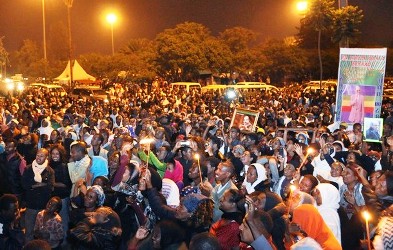S. Sudan defends declaration of three days of national mourning for Ethiopian leader
August 22, 2012 (ADDIS ABABA/JUBA) – South Sudan on Wednesday defended its decision to declare three days of national mourning in honour of the Ethiopian leader Meles Zenawi, who died on Monday.

Rumours began about 57-year-old Zenawi’s health after not making a public appearance since the G20 summit in Mexico in early June.
South Sudan extended its condolences to Ethiopia after the death.
Public opinion about the decision to have an extended period of South Sudanese national mourning has received mixed responses.
Dut Aguek Guit, a political science student at Juba University said on Wednesday that although Zenawi “played a vital role in the history of our liberation struggle” his death does not warrant such an extended period of mourning.
Guot asked why the government did not declare a day of mourning following the death of over 3,000 citizens in Jonglei state’s 2011 inter-tribal conflict.
Barnaba Marial Benjamin, South Sudan’s minister of information and broadcasting at a news conference on Tuesday, said the government had received the news of Zenawi’s death “with regret” but that “people will be doing their normal duties at work places; the holiday does not mean you stay at home but in your work while you mourn this great leader who was a very close friend to this country.”
Marial announced that the country’s president, Salva Kiir, had sent official condolences to the family of late Ethiopian leader as well as his friends and people of Ethiopia.
Marial also lauded Zenawi’s role in the peace accords reached between Juba and Kharoum.
Zenawi played a key diplomatic role in the peaceful Sudan-South Sudan separation and also in the efforts to resolving outstanding issues remaining from the 2005 peace accord.
“The absence of the late Prime Minister Meles Zanawi at the African Union High Implementation Panel Peace talks as chairperson of the African Union as well as chairperson of the Inter governmental Authority on Development (IGAD) will be greatly felt. His death his profound lost. His presence would have helped tremendously improve relations between the two countries because the relations and the level of understanding he enjoys with the leadership from the countries”, he explained
Luka Biong, a leading figure from the country’s ruling Sudan People’s Liberation Movement (SPLM) and co-chair the Abyei Joint Oversight Committee said Zenawi’s death leaves “a big vacuum” in talks involving the two countries.
Biong described the “friendly relations with leadership from both countries” that Zenawi enjoyed, downplaying suggestions that his demise will cause future negotiations between Juba and Khartoum to collapse.
Embassy’s deputy head of mission, David Dang, told Sudan Tribune that Kirr has also ordered the South Sudan flag to be lowered in honor of the late prime minister.
After a series of denials regarding Zenawi’s poor state of health, Ethiopian government officials earlier said Zenawi was recovering fast however it was said that he contracted sudden infections that led to his death.
His body arrived at Addis Ababa’s Bole Airport late on Tuesday where thousands of supporters gathered, along the streets to the national palace, in order to pay their respects.
Ethiopian communication minister Berket Simon said, a seven member national committee had been established to organise funeral proceedings, which is planned to be held next week.
The country’s council of ministers on Tuesday declared a national day of mourning, throughout which the national flag will fly at half-mast.
Deputy prime minister, Hailemariam Desalegn, has taken over as acting Prime Minister and will be sworn in as country’s new Prime Minister after an imminent parliamentary hearing.
Zenawi was born on May 8, 1955, in the northern Tigray region of Adwa town where he attended elementary and junior studies. He continued his high school in Addis Ababa and later joined university as a medical student but dropped out in his second year to join the armed struggle against the former dictator Mengistu Haile Mariam’s Communist military junta.
Zenawi assumed power as a president in 1991 after the former Mengustu regime was overthrown and became prime minister in 1995 and was from then on both the head of the federal government and national defence forces.
He was also the leader of the ruling party – Ethiopian People’s Revolutionary Democratic Front, a political party which swept over 99 percent of votes during elections in 2010.
The US government has seen Zenawi and the country as key security ally. Ethiopia has troops in Somalia battling Al-shabab insurgent groups and US military drones have based in Ethiopia’s south west, from where they patrol the region particularly Somalia.
Under Zenawi, Ethiopia has achieved tremendous economic growth but has long been under fire by rights organisations accusing his government of arbitrary arrests, torture and surveillance against opponents.
The government is also accused of a continued crackdown on critical journalists and media outlets.
Last week, The New York based press freedom advocacy group, Committee to Protect Journalists (CPJ) urged Ethiopian authorities to releases the recently jailed journalist and allow three banned Muslim news outlets to resume publishing immediately.
Human Rights Watch (HRW) on 15 August similarly urged authorities in Ethiopia to immediately release 17 prominent Muslim leaders who remain detained following a series of Muslim protests in the capital, Addis Ababa.
Various world leaders have spoken after Zenawi’s death, including British prime minister, David Cameron’s description of him as “inspirational spokesman for Africa on global issues and provided leadership and vision on Somalia and Sudan.” The UN secretary general, Ban Ki-moon said Zenawi “will be remembered for his exceptional leadership and advocacy on African issues within and outside the continent.”
(ST)
